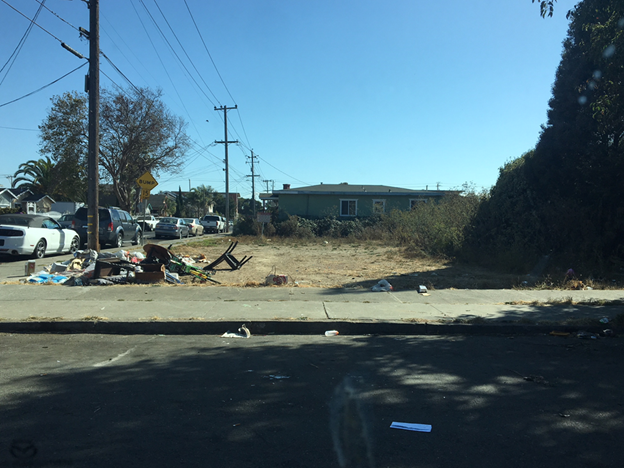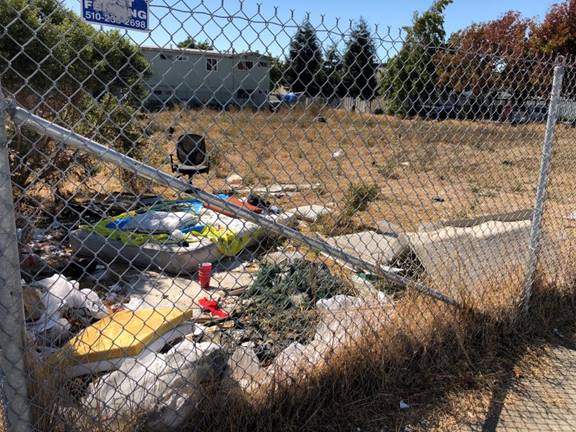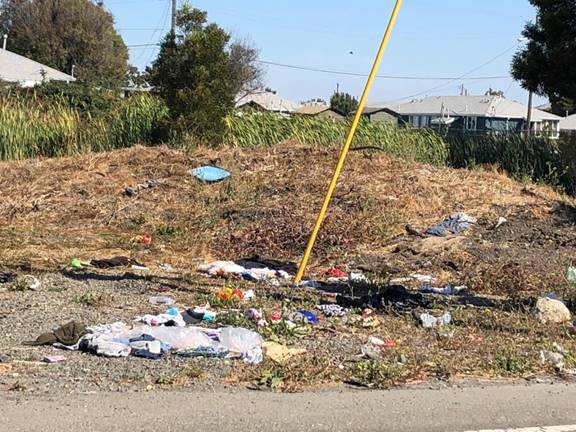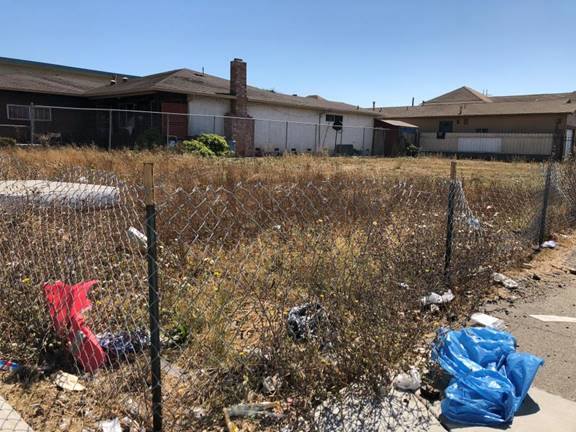Here is a simple decision tree about Measure T:
- Do you want to make a significant impact on alleviating homelessness in Richmond and stopping dumping and blight without increasing your taxes?
- If YES, then go to No. 2.
- If NO, then vote NO on Measure T
- Do you own a vacant lot or a vacant dilapidated or unkempt Building?
- If YES, then vote NO on Measure T.
- If NO, then vote YES on Measure T

Figure 1 - This is an example of the type of vacant lot Measure T is intended to target.
Below are answers that constitute my opinions on some questions posed by NextDoor subscribers about Measure T.
Question: I read a summary in Richmond Confidential. It [Measure T] proposes to tax all properties that are a) not developed $6000 per year and b) developed properties that are vacant at $3000 per year. To be deemed vacant, the property must be in use less than 50 days.
Answer: That is essentially correct, but there are numerous exemptions.
Question: How is the city going to determine what properties are vacant?
Answer: The County Assessor can provide a list of unimproved properties (vacant lots). The City would then contact owners to inquire if any of the exemptions apply. Identifying vacant buildings will be more challenging. This measure is targeted at long-term vacancies that constitute blight, such as boarded up windows and storefronts and unkempt yards and landscaping. Code enforcement and complaints will probably be the source of most identifications.
Question: Will home and condo owners receive a bill for $3000 then have to prove they live in their house? Will this proof subsequently be ignored by the city, resulting in multiple submissions, phone calls, emails, etc. to straighten out. I presume this will be done annually. Don’t tell me this can’t happen.
Answer: This measure is targeted at long-term vacancies that constitute blight, such as boarded up windows and storefronts and unkempt yards and landscaping. Code enforcement and complaints will probably be the source of most identifications. I would not want to see the draconian threats made under the rent control program used for this measure.
Question: This is being promoted as a way to develop empty lots, but this in of itself won’t create development. It may discourage investment on small lots as potential buyers will look to cities without such penalties.
Answer: This measure is clearly intended as a motivation to develop empty lots. Empty lots should be discouraged for use as simply investment commodities; that’s the whole point. Owners of vacant lots place a burden on both the city and the neighborhood. Vacant lots are a blight that adversely affect neighborhood property values, attract dumping and crime and require city expenditures that take money away from important services like police and street maintenance.
Question: This will lower property values.
Answer: The measure may result in some reduction in value of vacant lots because the holding cost will rise, motivating owners to sell, hopefully to someone who will develop them. It will, however, increase the value of other neighborhood properties by reducing blight and improving the image of the neighborhood and the perception of it a valuable, active and thriving place to live.
Question: Are there exemptions for people who take 1 or 2 year assignments out of the area and don’t want to be a rental manager?
Answer: If the property is kept up, it will probably stay under the radar. Also, under 13.58.030. F.1.b., there are exemptions for “An Owner who can demonstrate that exceptional specific circumstances prevent the use or development of the property. By way of example only and without limiting the generality of the foregoing, exceptional specific circumstances that prevent the use or development of property include property damage by a recent natural disaster, an undeveloped parcel adjoining a developed residential parcel and used by the occupants as part of the yard, and property with physical conditions that prevent development. The details of this exemption shall be further defined by separate ordinance of the City Council.” An out of area assignment might be considered such “exceptional specific circumstances.” Also, 13.58.030. F.1.2 requires that “The City Council shall, by ordinance, authorize the application of the exemptions listed in this Section, establish such other exemptions to the tax imposed by this Ordinance, and authorize the methods of collection of the tax, as it determines to be appropriate.” Unlike the rent control ordinance, this ordinance is flexible, and it is anticipated that other reasonable exemptions will be adopted. See “Exemptions,” below.
Question: What about in the case of an inherited property from an estate that might take a year or more to settle and ultimately sell?
Answer: See answer to preceding question.
Question: It proposes to use only 25% for code enforcement. Given that code enforcement is very expensive and we are constantly told it’s underfunded, this sounds like a low percentage.
Answer: The amount allocated to code enforcement will augment what is already being spent, not supplant it. Also, the reduction in vacant lots will reduce the cost of code enforcement.
Question: The remaining 75% is to be used for homeless services. We have no idea how this will be apportioned and what programs we are paying for. The objective should be to reduce the number of homeless people and encampments in Richmond. The emphasis on “services” may create a perverse incentive that increases the number of homeless in the city.
Answer: Section 13.58.060.A lists ten types of homeless services that can be funded by the measure.
Question: I see many future “special assessments” and sales taxes to that will be promised to finally actually once and for all improve conditions in Richmond or address the problems this tax could create.
Answer: Any new tax would have to go to the ballot and be voted on.

Figure 2 - An example of a vacant lot that is targeted by Measure T

Figure 3 - An example of the type of vacant lot targeted by Measure T

Figure 4 - An example of a vacant lot targeted by Measure T
http://richmondconfidential.org/2018/09/09/as-vacant-property-tax-vote-nears-residents-debate-effectiveness/
Exemptions. 1. The following maybe exempt from the tax imposed by this Ordinance:
a. An Owner who qualifies as very low-income, as the term “very low income” is defined by the United States Department of Housing and Urban Development.
b. An Owner who can demonstrate that exceptional specific circumstances prevent the use or development of the property. By way of example only and without limiting the generality of the foregoing, exceptional specific circumstances that prevent the use or development of property include property damage by a recent natural disaster, an undeveloped parcel adjoining a developed residential parcel and used by the occupants as part of the yard, and property with physical conditions that prevent development. The details of this exemption shall be further defined by separate ordinance of the City Council.
c. An Owner of a property that is under active construction. To qualify for this exemption, an Owner must call for inspections of the construction with sufficient frequency to keep the building permit or permits active.
d. An Owner of property for which an active building permit application is being processed by the City.
e. An Owner of a parcel included in a substantially complete application forplanning approvals that has not yet received approval. An Owner of a parcel for which a project with development entitlements have been approved but needing time for completion may apply for and receive an administrative two-year exemption.
f. An Owner of property for which at least 60 percent of the accessible dry land is actively used for Community Garden(s), Outdoor Agriculture, or Urban Agriculture as defined in section 15.04.104.020 and developed in accordance with the applicable standards set forth in Article XVof this Code.
2. The City Council shall, by ordinance, authorize the application of the exemptions listed in this Section, establish such other exemptions to the tax imposed by this Ordinance, and authorize the methods of collection of the tax, as it determines to be appropriate.
3. The City Manager’s designee, (which if not otherwise designated shall be the Finance Director), shall establish the procedures and guidelines for owners to apply for, and grant, the exemptions identified in this section and/or authorized by the Council. Owners who claim an exemption may be required to submit information annually to substantiate their continuing qualification for the exemption. |

